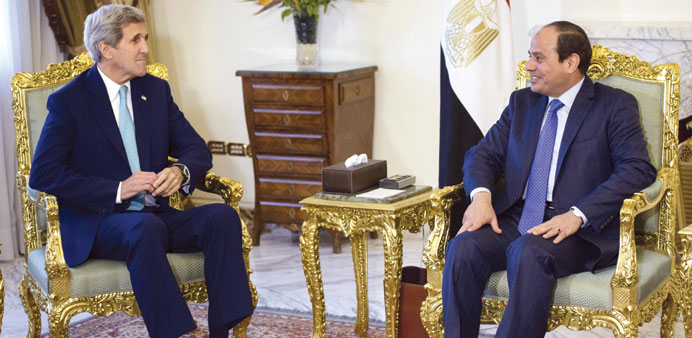US Secretary of State John Kerry and Egypt’s President Abdel Fattah al-Sisi sit before a meeting at the presidential palace in Cairo yesterday.
Egyptian Foreign Minister Sameh Shoukry says his country has no major disagreements with Washington but there are “differences in points of view over some issues, which is natural”
Reuters
Cairo
The United States and Egypt are returning to a “stronger base” in bilateral ties despite tensions and human rights concerns, US Secretary of State John Kerry said yesterday after talks with his Egyptian counterpart.
“Egypt remains vital ... to engagement and stability in the region as a whole,” said Kerry, who held the first strategic dialogue between the two countries since 2009.
“There are obviously circumstances where we have found reason to have grave concern and we have expressed it very publicly,” he said at a news conference with Foreign Minister Sameh Shoukry. “But we have multiple issues that we need to work on simultaneously.”
US-Egyptian relations cooled after Islamist president Mohamed Mursi was ousted in 2013 by the military amid mass protests against his rule.
But Cairo remains one of Washington’s closest security allies in the Middle East, an increasingly crucial role in a region beset by turmoil in Syria, Iraq, Yemen and Libya.
Kerry also used the visit to lobby for last month’s nuclear deal between world powers and Iran, which has been met with scepticism by Washington’s Arab allies.
“There can be absolutely no question that the Vienna plan, if implemented, will make Egypt and all the countries of this region safer than they otherwise would be,” he said.
Kerry said Iran’s role as the “number one state sponsor of terror in the world” made the nuclear deal even more important. “If Iran is destabilising, it is far, far better to have an Iran that doesn’t have a nuclear weapon than one that does,” he said.
Shoukry told journalists his country had no major disagreements with Washington but there were “differences in points of view over some issues, which is natural”.
While Washington supports former general Abdel Fattah al-Sisi, who led Mursi’s overthrow and was elected to succeed him, it has also cautiously criticised Egypt’s human rights record.
Following Mursi’s ouster, Cairo launched a tough crackdown on the now outlawed Muslim Brotherhood. Security forces killed hundreds of Brotherhood supporters, jailed thousands of others. They then went after liberal activists.
Egypt says the Brotherhood is a terrorist group that poses a threat to national security. The interior ministry denies allegations of widespread human rights abuses.
In one such rights case, a Cairo court yesterday postponed giving its verdict in the retrial of Al Jazeera television journalists accused of aiding a terrorist organisation, a reference to the Brotherhood.
Shoukry said no journalists in Egypt were in jail over their reporting. The Committee to Protect Journalists said a prison census it had conducted on June 1 found at least 18 Egyptian journalists were being held in jail for reasons related to their reporting. A government source at the time said that the numbers were not accurate.
Cairo and Washington have been exploring opportunities to expand their security relationship. In late March, US President Barack Obama lifted a hold on supplying arms to Cairo, authorising deliveries valued at over $1.3bn.
The United States delivered eight F-16 fighter jets last week to Egypt, which is battling insurgents in the Sinai Peninsula who have killed hundreds of soldiers and police since Mursi’s removal. The most active group is Sinai Province, an affiliate of Islamic State.
Hours after the joint press conference, demonstrators in central Cairo burned American and Israeli flags in protest against the death of a Palestinian toddler who died in a suspected Jewish extremist arson attack on his home in the occupied West Bank on Friday.

